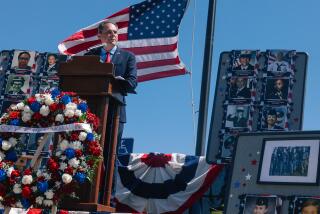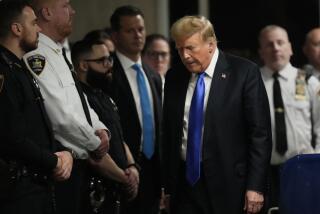King Case Verdicts Draw Local Support : Jurors: A member of the Simi panel in the first trial is happy with Officer Powell’s conviction. But two others have mixed emotions about the overall outcome.
- Share via
One of the Ventura County jurors who delivered last year’s verdicts in the Rodney G. King beating case said she was pleased the federal jury in Los Angeles accomplished what she could not: the conviction of Officer Laurence M. Powell.
Two other jury members said they also sought to convict Powell last year but have mixed emotions about the federal case’s outcome.
The remaining jurors could not be reached for comment Saturday. And a fourth juror, who served as forewoman for the Ventura County jury, told the Associated Press she would agree with the federal jury’s verdicts “no matter what.”
“I feel that no matter what the verdict had been, I would agree with it,” Dorothy Bailey said. “I do not have the prerogative to question their decision. I don’t think anybody has, unless they were sitting there every day,” said the 66-year-old Bailey, who has moved from Camarillo to Utah.
Three jury members who had argued to find Powell guilty in the state trial last year--Virginia B. Loya of Ventura, Christopher C. Morgan of Simi Valley and a Thousand Oaks man who did not want to be identified--eventually joined with the others in acquitting the officer of assault with a deadly weapon.
But they held out on the charge of assault under color of authority, causing the jury to deadlock on that count against Powell.
Loya, 42, said she and her family hugged Saturday morning after watching TV reports of the guilty verdicts against Powell and Sgt. Stacey C. Koon.
“I’m pleased,” she said. The federal jury “ended up with what I really wanted.”
Loya said Powell’s guilt was obvious from the video of the King beating shot by amateur camera man George Holliday. “The beating, the overexcessive force he used, all of that right there shows he was completely out of control.”
The federal jury was also right to convict Koon, she said.
“He was the officer in charge,” she said. “He could have stopped (King) in some other way. With so many officers there, there’s something he should have come up with.”
Loya said she was also pleased by the acquittals of officers Timothy E. Wind and Theodore J. Briseno.
“I saw the film at a slower pace,” she said of the segment showing Briseno stomping the prone King on the back of his neck--which the officer’s attorneys argued Briseno did to keep King from rising and getting beaten further. “It did show that he was trying to help.”
Morgan, who said his family endured months of threats after the first trial, did not share Loya’s pleasure with the federal verdicts. “There’s nothing to feel good about,” he said.
Although he thinks Powell used excessive force against King, it bothers him that the two juries will be compared when the trials were so different.
In addition to having different prosecutors, witnesses and testimony, the federal trial appeared to have a more controlled atmosphere than the one in Simi Valley, he said.
“The first trial was a three-ring circus,” largely because it was televised, he said. “We did the best job we could do under the circumstances.”
Like Morgan, the Thousand Oaks juror said he is concerned that people will compare the two juries without taking account of the differences in the trials.
The 39-year-old juror, a computer programmer and father of three young children, was cautious in evaluating the federal verdicts.
“My concern is whether it was justice or mob justice,” he said, referring to the threat of more rioting that had hung over the jury in the federal civil rights case.
He said he agreed that Powell violated King’s civil rights. “But I didn’t want to see him railroaded,” he said, as he sat in his living room Saturday morning.
The Thousand Oaks man said he believes federal prosecutors did a better job than Los Angeles County deputy district attorneys last year in arguing to convict the four police officers.
During the trial in Simi Valley, the juror had thought that Koon was guilty to some degree. “But I was not sure beyond a reasonable doubt,” he said.
Although he stands by his decisions in last year’s trial, the juror said he still carries “the emotional baggage” of the public response to the jury’s verdicts. “It’s still hard to accept (that) something I did triggered the riots.”
He said he does not take responsibility for the burning, looting and beatings that swept Los Angeles. The economic conditions in the poorest parts of Los Angeles were the root cause of the unrest, he said.
Now, the soft-spoken man said, after spending much of the past year defending the verdicts he and his fellow jurors rendered, he just wants to get on with his life.
But noting that the trial of the men charged with beating truck driver Reginald O. Denny during the riots and the sentencing of Powell and Koon are still ahead, he said, “I’m not convinced I can put it behind.”
More to Read
Sign up for Essential California
The most important California stories and recommendations in your inbox every morning.
You may occasionally receive promotional content from the Los Angeles Times.










